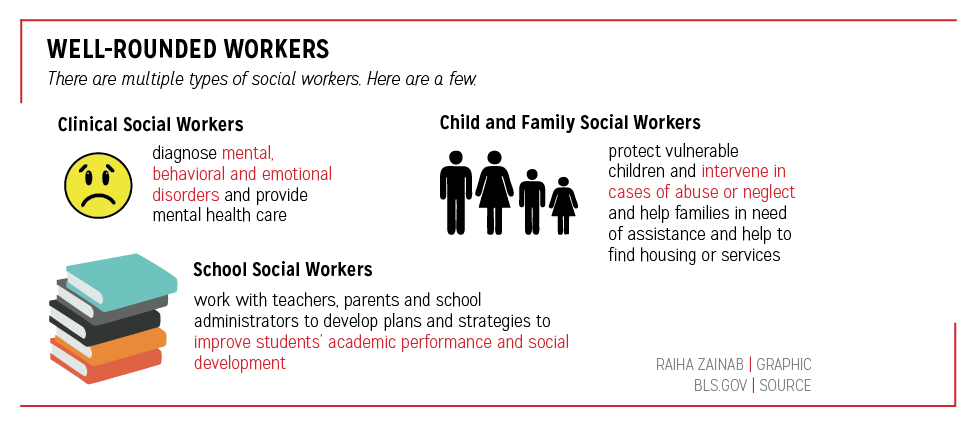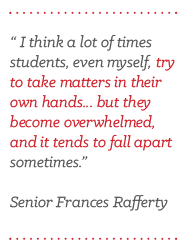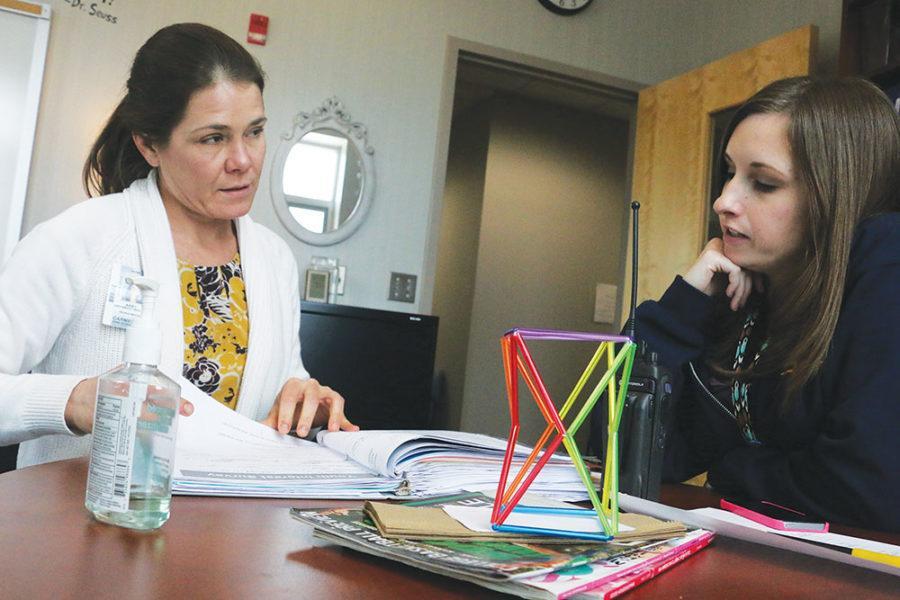March is national social Workers’ Month, a period of time set aside to educate society about the invaluable contributions of individuals such as CHS social worker Abby Cartwright-Brattain.
For the past seven years, Cartwright-Brattain said she has conducted individual and group counseling so students can find support. She also conducts prevention and mentoring programs. Most importantly, she helps families of students find resources. From looking at data to getting referrals from teachers, she said she did everything she can to find those students among thousands who may need help with the social injustices in their lives.
“The most difficult part (of my job) is just knowing all of the things going in (students’) lives that are tragic and awful, but knowing you can only do so much and wondering how they’re doing after the day’s over with,” Cartwright-Brattain said.
To her, a social worker is an advocate for people who have social injustices in their life.
Yet, social workers often work behind the scenes, away from the attention of many students and teachers. In July 2016, Odyssey, which is a social media platform that democratizes content, published a column written by Julia Kalish, a social worker in training. She stated, “Social workers are extremely underrated for the life-changing and genuine work they accomplish.”
Cartwright, for her part, said, “I wouldn’t necessarily say (social workers are) underrated, but I don’t think all of the students know about my position or what social workers do in a school.”
However, social workers are not the only people at CHS who do important but often anonymous work. Frances Rafferty, GKOM council member and senior, said the GKOM council is underrated because it is seen as a lesser form of leadership at this school. In fact, most students do not know GKOM council members are actually student mediators. Because of this, she said it can sometimes be problematic.
“I do wish that (the terms GKOM council and student mediators) were put together more because it’s important to know that we exist. I think a lot of the times students, even myself, try to take matters in their own hands, and there’s so many different moving pieces of a problem that they can’t all try to handle themselves, and they try to, but they become overwhelmed, and it tends to fall apart sometimes,” Rafferty said.
 GKOM lead sponsor Mike Meyer said he tries to give these student mediators as much freedom as possible when they are solving minor issues such as student time management advice, by asking them to handle it themselves unless the situation is serious. At that point, Cartwright-Brattain said the GKOM is trained to let the GKOM sponsors, counselor or a social worker know.
GKOM lead sponsor Mike Meyer said he tries to give these student mediators as much freedom as possible when they are solving minor issues such as student time management advice, by asking them to handle it themselves unless the situation is serious. At that point, Cartwright-Brattain said the GKOM is trained to let the GKOM sponsors, counselor or a social worker know.
“It’s important to break out of your shell and seek help if you need help with a problem,” Rafferty said. “(Student mediators are) here to help. We are specifically trained to deal with difficult situations.”
At the same time, Cartwright-Brattain said she understands students may never reach out to her themselves because they may not know how to, feel embarrassed or just simply not want to talk to an adult, but she said she is not a judging person at all.
“I think I make everyone feel comfortable when they come. Once they get here, I don’t really have kids who don’t want to see me. I think knowing that it’s confidential and (that) it’s a judge-free zone, I’m hoping that kids would want to come,” Cartwright-Brattain said. “I know that kids are going through so many things right now, and that’s why we’re here, so they should try to come down and get some help.”
In some situations, Rafferty said it is also possible for students to question whether or not the adult they went to for help actually cares about them.
In response, Cartwright-Brattain said, “Me personally, I care about every kid that’s in here. That’s why I got into this field. When I was in high school, I felt like there weren’t adults that really cared, and that was the first thing that made me to want to get in a field like this. I haven’t forgotten that’s how I was felt at that age.”
As a result, Meyer said the goal of both the GKOM program and social working is personal engagement; it does not matter who students reach out for as long as they seek help.
Cartwright-Brattain said, “I want all of the kids to take care of themselves mentally and emotionally. I feel like kids are so overworked, spread themselves so thin, have so much anxiety and just I want them to be happy young people, not worry about so many things. I hope that if they have problems going on, then I can help solve some of (the problems) with them.”































![What happened to theater etiquette? [opinion]](https://hilite.org/wp-content/uploads/2025/04/Entertainment-Perspective-Cover-1200x471.jpg)














































![Review: “The Immortal Soul Salvage Yard:” A criminally underrated poetry collection [MUSE]](https://hilite.org/wp-content/uploads/2025/03/71cju6TvqmL._AC_UF10001000_QL80_.jpg)
![Review: "Dog Man" is Unapologetically Chaotic [MUSE]](https://hilite.org/wp-content/uploads/2025/03/dogman-1200x700.jpg)
![Review: "Ne Zha 2": The WeChat family reunion I didn’t know I needed [MUSE]](https://hilite.org/wp-content/uploads/2025/03/unnamed-4.png)
![Review in Print: Maripaz Villar brings a delightfully unique style to the world of WEBTOON [MUSE]](https://hilite.org/wp-content/uploads/2023/12/maripazcover-1200x960.jpg)
![Review: “The Sword of Kaigen” is a masterpiece [MUSE]](https://hilite.org/wp-content/uploads/2023/11/Screenshot-2023-11-26-201051.png)
![Review: Gateron Oil Kings, great linear switches, okay price [MUSE]](https://hilite.org/wp-content/uploads/2023/11/Screenshot-2023-11-26-200553.png)
![Review: “A Haunting in Venice” is a significant improvement from other Agatha Christie adaptations [MUSE]](https://hilite.org/wp-content/uploads/2023/11/e7ee2938a6d422669771bce6d8088521.jpg)
![Review: A Thanksgiving story from elementary school, still just as interesting [MUSE]](https://hilite.org/wp-content/uploads/2023/11/Screenshot-2023-11-26-195514-987x1200.png)
![Review: "When I Fly Towards You", cute, uplifting youth drama [MUSE]](https://hilite.org/wp-content/uploads/2023/09/When-I-Fly-Towards-You-Chinese-drama.png)
![Postcards from Muse: Hawaii Travel Diary [MUSE]](https://hilite.org/wp-content/uploads/2023/09/My-project-1-1200x1200.jpg)
![Review: "Ladybug & Cat Noir: The Movie," departure from original show [MUSE]](https://hilite.org/wp-content/uploads/2023/09/Ladybug__Cat_Noir_-_The_Movie_poster.jpg)
![Review in Print: "Hidden Love" is the cute, uplifting drama everyone needs [MUSE]](https://hilite.org/wp-content/uploads/2023/09/hiddenlovecover-e1693597208225-1030x1200.png)
![Review in Print: "Heartstopper" is the heartwarming queer romance we all need [MUSE]](https://hilite.org/wp-content/uploads/2023/08/museheartstoppercover-1200x654.png)



